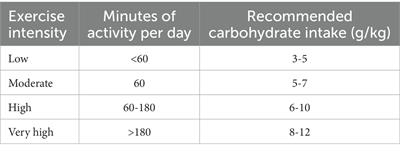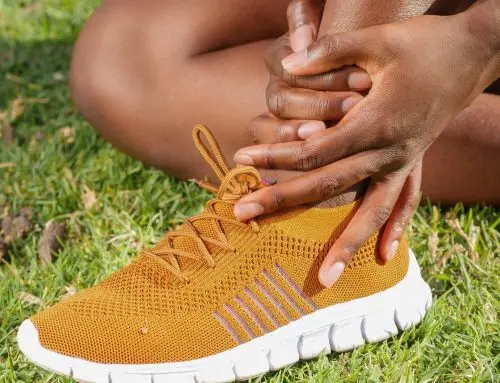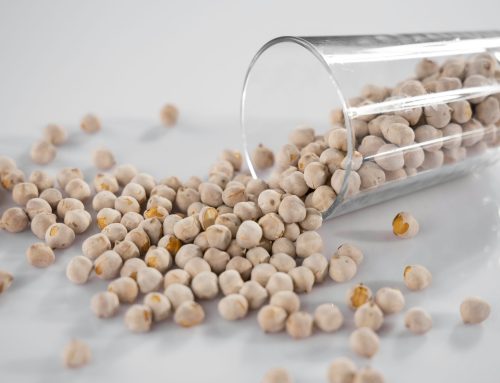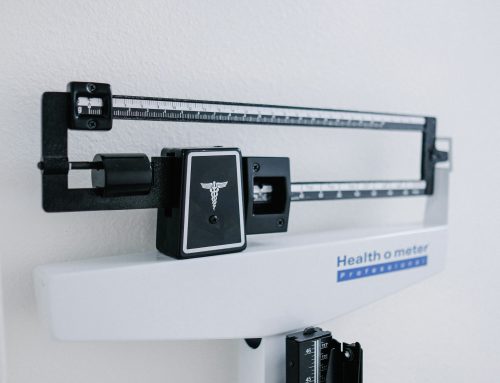Do you ever feel like your body is a well-oiled machine that’s constantly running on fumes? Well, fear not, fellow fitness enthusiasts, because carbohydrates are here to save the day! In this article, we’re going to dive into the delicious world of carbs and uncover their magical powers when it comes to exercise and muscle-recovery/” title=”Foam Rolling: An Essential Tool for Muscle Recovery”>recovery. So grab a spoonful of pasta (or maybe a handful of gummy bears, if that’s more your style) and let’s dig in!
Contents
- 1
- 2 Effects of Carbohydrate Intake on Endurance Performance
- 3 Role of Carbohydrates in Muscle Glycogen Storage
- 4 Impact of Carbohydrate Timing on Exercise Recovery
- 5 Optimal Carbohydrate Consumption for Athletes
- 6 Incorporating Carbohydrates into Pre- and Post-Workout Meals
- 7 FAQs
- 8 —
- 9 Carb Up and Crush It!
fuel-for-exercise”>Importance of Carbohydrates as Fuel for Exercise
Carbohydrates are like the high-octane fuel for your body when it comes to exercise. Just like a sports car needs premium gasoline to perform at its best, your body needs carbs to power through that spin class or crush that 5k run.
When you hit the gym or lace up your running shoes, your body relies on carbohydrates to provide quick energy. These little powerhouses are like the energizer bunny for your muscles, keeping them going strong so you can lift heavier, run faster, or jump higher.
Think of carbohydrates as your body’s own personal rocket fuel. They help you sprint like Usain Bolt or powerlift like Arnold Schwarzenegger (or at least pretend to at the gym).
- Carbohydrates are essential for maintaining your energy levels during exercise
- They help prevent fatigue and keep your muscles firing on all cylinders
- So next time you’re debating between that salad or a slice of pizza before a workout, remember that carbs are your friend and fuel for your fitness goals!

Effects of Carbohydrate Intake on Endurance Performance
Many athletes wonder how their carbohydrate intake affects their endurance performance. Well, let me break it down for you in a way that even a potato could understand.
First off, carbs are like the fuel that powers your engine during a long workout or race. If you don’t have enough carbs stored up in your body, it’s like trying to run a marathon on an empty tank of gas – you’re not going to get very far. So, make sure to load up on those pasta dinners and banana bread snacks before you hit the track.
But be careful not to overdo it on the carbs, either. Eating too much can lead to that dreaded feeling of “bonking” mid-race, where your body runs out of fuel and you hit the wall faster than a clumsy toddler. So, aim for a balance of complex and simple carbs to keep your energy levels steady throughout your workout.
Remember, carbohydrates are your best friends when it comes to endurance performance. They provide the energy you need to go that extra mile and push through the pain. So, treat them with the love and respect they deserve, and they’ll repay you with some serious speed and stamina.

Role of Carbohydrates in Muscle Glycogen Storage
Carbohydrates play a crucial role in muscle glycogen storage, providing the primary source of energy for those intense workouts at the gym. Without enough carbs, your muscles will be left feeling like they’re running on empty, much like a car with an empty gas tank.
When you chow down on delicious carb-filled foods like pasta, rice, and bread, your body breaks them down into glucose, which is then stored as glycogen in your muscles. It’s like stocking up your pantry with all the supplies you need to keep your muscles fueled and ready for action.
Think of muscle glycogen as your body’s secret stash of energy reserves, ready to be tapped into whenever you need to lift heavy weights or sprint like Usain Bolt. Without enough carbs in your diet, your muscles will be left feeling sluggish and fatigued, much like trying to run a marathon after a night of binge-watching your favorite Netflix series.

Impact of Carbohydrate Timing on Exercise Recovery
Ever wonder if timing your carbohydrate intake can affect how well you recover from exercise? Well, grab a snack and get ready to learn how you can optimize your post-workout recovery with some strategic carb consumption!
Picture this: you finish a grueling workout and your muscles are screaming for some fuel to help them repair and rebuild. By strategically timing your carbohydrate intake post-exercise, you can maximize glycogen replenishment and muscle recovery. It’s like giving your muscles a high-five and saying, “Hey, I got you, fam!”
So, when should you chow down on those carbs? Right after your workout is prime time. Your muscles are like little carb sponges, ready to soak up all that glucose and use it to replenish their energy stores. Plus, pairing those carbs with some protein can help enhance the recovery process even more. It’s like a power duo, kicking butt and taking names!
Next time you hit the gym, make sure you have a post-workout snack waiting in the wings. Your muscles will thank you, and you’ll be one step closer to becoming a recovery rockstar!

Optimal Carbohydrate Consumption for Athletes
So, you want to know how many carbs you should be shoveling into your athlete’s mouth? Well, you’ve come to the right place! Let’s break it down for you in a way even your grandma could understand.
First things first, carbs are your body’s main source of fuel. So, if you want to be faster than Usain Bolt or jump higher than Michael Jordan, you better be fueling up on those bad boys. But how many should you be eating? Well, it all depends on how much you’re sweating it out on the field or in the gym.
For light to moderate activity, aim for around 3-5 grams of carbs per kilogram of body weight. But if you’re training like a beast and breaking a sweat harder than a water faucet in the Sahara Desert, you might want to up that to 5-8 grams per kilogram of body weight. Just remember, carbs are your friends, not your enemies. Treat them with the love and respect they deserve!
And hey, if you’re feeling overwhelmed trying to figure out your carb intake, don’t stress. Just listen to your body and fuel it with the energy it needs to perform like the superstar athlete you were born to be. Now go out there and crush those goals, you carb-loading machine!
Incorporating Carbohydrates into Pre- and Post-Workout Meals
Carbohydrates are like the fuel that powers a car – you wouldn’t expect your vehicle to run without it, so why expect your body to perform at its best without carbs? When planning your pre- and post-workout meals, incorporating carbohydrates is key to helping your body get the energy it needs.
For your pre-workout meal, aim to consume a good source of complex carbohydrates like whole grains, fruits, and vegetables. They provide a steady release of energy to fuel your workout. Pair them with a lean protein source for sustained energy and muscle repair. Think a turkey and avocado sandwich on whole grain bread or a fruit smoothie with Greek yogurt.
After your workout, your body is begging for some quick-digesting sugars to replenish its glycogen stores and kickstart muscle recovery. Indulge in some simple carbs like a banana, energy bar, or even a small bowl of cereal with milk. Pair it with a protein source for optimal recovery. Maybe a peanut butter and jelly sandwich or a protein shake with a side of pretzels.
Remember, balance is key when it comes to incorporating carbohydrates into your pre- and post-workout meals. Don’t go overboard, but don’t skimp either. Your body needs those carbs for energy and recovery - so eat up and get ready to crush your next workout!
FAQs
Why are carbohydrates important for exercise and recovery?
Carbohydrates are like the fuel that powers your workout engine. They provide the energy your muscles need to keep on pumping and help replenish your energy stores after you’ve given it your all at the gym. So, without carbs, it’s like trying to drive a car with an empty gas tank - not gonna get you very far!
What role do carbohydrates play in fueling high-intensity exercise?
When you’re busting out those HIIT workouts or crushing a CrossFit session, carbohydrates are your best friend. They quickly break down into glucose, which is the preferred fuel source for high-intensity exercise. So, if you want to go all out during your workouts, carb up!
How do carbohydrates aid in recovery after exercise?
After you’ve crushed your workout, your muscles are screaming for some TLC. Carbs swoop in like a superhero to help replenish your glycogen stores and kickstart the muscle repair process. Plus, pairing carbs with protein helps speed up recovery even more.
Can eating carbs before exercise improve performance?
Absolutely! Eating carbs before exercise can give you that extra oomph you need to crush your workout. They provide a readily available source of energy for your muscles, allowing you to go harder and longer than you would on an empty stomach. So, carb-load like it’s nobody’s business!
Should athletes focus on specific types of carbohydrates for optimal performance?
Not all carbs are created equal, my friend. Opt for complex carbs like whole grains, fruits, and vegetables, which provide a steady release of energy throughout your workout. And don’t forget some simple carbs for that quick energy boost when you need it most. Your body will thank you later!
—
Carb Up and Crush It!
So, next time you’re hitting the gym or hitting the pavement, remember the important role that carbohydrates play in your exercise and recovery. Don’t fear the carbs – embrace them! Fuel your workouts and replenish your energy stores like the champion you are. And hey, if all else fails, at least you’ll have an excuse to indulge in some post-workout pizza…right? Happy sweating, carb-lovers!








Leave A Comment